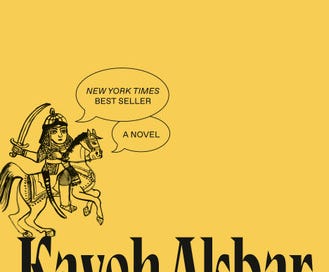I just finished a poet’s debut novel, Martyr!, which took me several weeks to read, partly because the language is so rich and dense and partly because the novel doesn’t contain a lot of action. Despite some lag in the middle, I still thought the novel was brilliant.
The story focuses on a young recovering addict named Cyrus Shams, an Iranian-American whose mother was killed when a US warship shot down an Iranian passenger jet over the Persian Gulf 30+ years ago. Historical references to the actual shooting down of this passenger plane, which contained more than 60 children, are included throughout the book. Following this tragedy, Cyrus is raised by his hapless single father in nowhere, Indiana, where the father works at a chicken plant killing birds all day and drinking all night. The only other person in his life connecting him to his lost mother is his uncle, his mother’s brother, a war vet suffering PTSD after his stint as the angel of death in the Iran-Iraq war. (This was an actual role men were tasked to play as they rode in costume on horseback among the dying, encouraging them to believe in an afterlife.)
Cyrus is an addict and an alcoholic and, eventually, in sobriety, a poet. But despite his sobriety, the protagonist is suicidal, and he believes the only thing that keeps him from killing himself is his wish not to “waste” his death, but rather to do something meaningful in his life or death that would give his death meaning (and thus make him a martyr). He becomes so consumed with the idea of martyrdom, that he begins writing a book about martyrs in history, and throughout the novel several poems and passages from that (fictional) book are included in the book we are reading.
From the beginning of the novel I felt a deep connection with Kyle, my own addict/alcoholic / poet son, dead of an overdose at age 26. Martyr! would have been a book he would have enjoyed reading and discussing, and I longed to discuss it with him. David Foster Wallace’s Infinite Jest is a lengthy book about recovery that I know Kyle savored, especially for its dark humor, but which he also warned me against reading, as he thought I wouldn’t like it. But in this book, as I read every scene of recovery or narcotic use or even of the character’s ambivalence toward his own bisexuality, I felt Kyle reading with me, felt him agreeing with the portrayal being presented. I felt like the book was giving me some insight into feelings he had that I couldn’t previously connect with, particularly with his obsession with the meaning of life, which I believe he never discovered—and to which the author only alludes.
The author of the novel, Kaveh Akbar, is himself 10 years sober so is clearly able to write with authority about the foibles and rewards of sobriety. When he was drinking, he regularly pissed himself in his sleep and did a lot of other things he’d rather not remember, but he makes clear that the wild stories about being high told ad nauseum in meetings are essentially all the same in that they lack any real meaning. They are all just about how stupidly we act when under the influence. In the end, the novel suggests, our only meaningful stories take place when we are not high and thus able to care about something besides drugs.
Indeed, the book suggests that the only thing that ultimately matters is love, not necessarily romantic love, but love that is constant and upon which one can eternally rely. (I just realized that this describes God’s love, though the novel never states anything that obvious, just as it is too smart a book to ever say anything directly about how much love matters.) In one scene, Cyrus rejects his sponsor and vows never to return to a twelve-step meeting nor speak to his sponsor again, but the sponsor continues to check in on him, ensuring Simon understands the sponsor’s love isn’t going anywhere. In another scene, he lets his friend/sometime lover Zee know he doesn’t think anyone would care if he killed himself, and Zee shows him what the absence of love would feel like.
The book has several fantastical elements. There are a lot of dream descriptions, scenes where famous people (Kareem Abdul-Jabaar, Lisa from The Simpsons, Rumi) and not-famous people (Cyrus’s parents, for example) have lengthy conversations whose meaning isn’t always clear yet sometimes seems mystically on-point. And in the final scene (without giving anything away), the scene before the Coda, something decidedly mystical and apocalyptic is happening, and I am not entirely sure of the meaning, only that it made me smile and feel deeply hopeful. I guess that’s the ultimate take-away: that a book about an Iranian-American child wronged by the U.S., abandoned by his parents, wanting only to die as he pushes love away, can still in the end find the wonder in life and love. The book is remarkably hopeful and beautifully written.
STOP HERE TO AVOID SPOILERS
That would have been the end of my review, but I had questions, so I went on Reddit and other websites and read reviews and now am less sure about the ending. Some people seem to think that in the end, Cyrus gets his wish and dies and that all the fantastical stuff that happens in that last scene are happening because Cyrus is dead. That would be VERY upsetting if true. However, now that I’ve read all the spoilers explaining why this is true (e.g., the hotel clerk asking Cyrus as he checks out if he created anything while he was there), I believe this is probably the real meaning. But WHY would the author kill his darling before allowing him to discover the meaning of life? This seems tragically unfair. But then, I suppose so is life.




